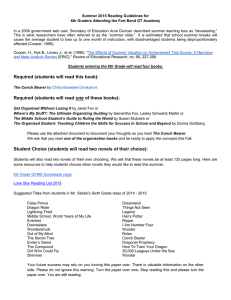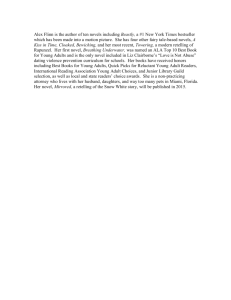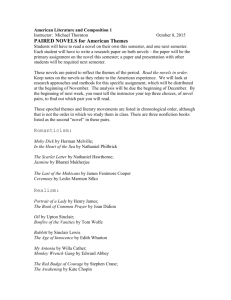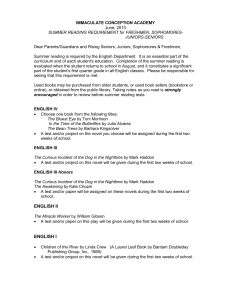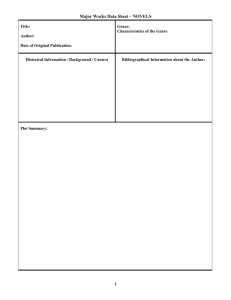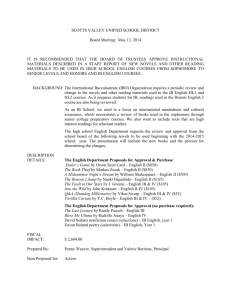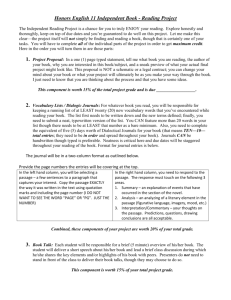Summer 2014 Reading Guidelines for
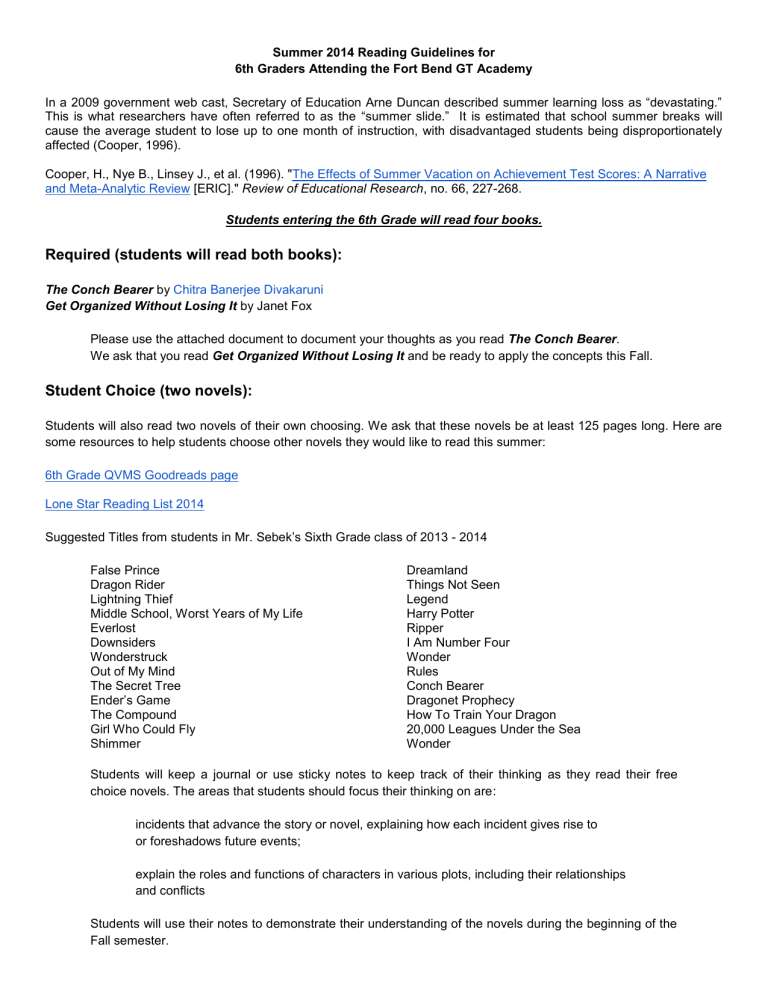
Summer 2014 Reading Guidelines for
6th Graders Attending the Fort Bend GT Academy
In a 2009 government web cast, Secretary of Education Arne Duncan described summer learning loss as “devastating.”
This is what researchers have often referred to as the “summer slide.” It is estimated that school summer breaks will cause the average student to lose up to one month of instruction, with disadvantaged students being disproportionately affected (Cooper, 1996).
Cooper, H., Nye B., Linsey J., et al. (1996). " The Effects of Summer Vacation on Achievement Test Scores: A Narrative and Meta-Analytic Review [ERIC]." Review of Educational Research , no. 66, 227-268.
Students entering the 6th Grade will read four books.
Required (students will read both books):
The Conch Bearer by Chitra Banerjee Divakaruni
Get Organized Without Losing It by Janet Fox
Please use the attached document to document your thoughts as you read The Conch Bearer .
We ask that you read Get Organized Without Losing It and be ready to apply the concepts this Fall.
Student Choice (two novels):
Students will also read two novels of their own choosing. We ask that these novels be at least 125 pages long. Here are some resources to help students choose other novels they would like to read this summer:
6th Grade QVMS Goodreads page
Lone Star Reading List 2014
Suggested Titles from students in Mr. Sebek’s Sixth Grade class of 2013 - 2014
False Prince
Dragon Rider
Lightning Thief
Middle School, Worst Years of My Life
Everlost
Downsiders
Wonderstruck
Out of My Mind
The Secret Tree
Ender’s Game
The Compound
Girl Who Could Fly
Shimmer
Dreamland
Things Not Seen
Legend
Harry Potter
Ripper
I Am Number Four
Wonder
Rules
Conch Bearer
Dragonet Prophecy
How To Train Your Dragon
20,000 Leagues Under the Sea
Wonder
Students will keep a journal or use sticky notes to keep track of their thinking as they read their free choice novels. The areas that students should focus their thinking on are: incidents that advance the story or novel, explaining how each incident gives rise to or foreshadows future events; explain the roles and functions of characters in various plots, including their relationships and conflicts
Students will use their notes to demonstrate their understanding of the novels during the beginning of the
Fall semester.
Read and earn books from Barnes and Noble this summer:
Barnes and Noble Summer Reading
This document can be found on www.mrsebek.com
under the Summer Reading tab with active links to the sites mentioned throughout the document.
Optional Reading: Replace a Novel of Choice
Read, Learn, Share
Fictional books are not the only types of text you can read. Please keep track of the amount you read in spaces other than fictional texts. If you spend more than twenty hours learning from non-fiction texts or online sites you can replace one free choice book with the documented learning you have done using traditional and digital media .
For the purposes of summer reading, learning is defined as the act of acquiring new, or modifying and reinforcing, existing knowledge, behaviors, skills, values, or preferences and may involve synthesizing different types of information.
So if you go online and learn how to code or learn algebra or build a video game or make something new, keep track of your time and the sites you visit or books you read and make preparations to show what it is you learned how to do.
Use the template below, which can be found on www.mrsebek.com
under the Summer Reading tab, to document your progress as you read and learn. You may type directly into the tables on the online document. Or copy the tables into a new document. The documentation of your reading will be required in order to be exempt from one novel of choice.
In order to be exempt from the second summer reading novel you will turn in your documented time sheets and begin preparing a presentation of your learning. Your presentation will be digital so that it can be shared with a wider audience through Mr. Sebek’s website and other forms of digital media.
Log for keeping track of online reading:
Website visited:
URL (copy and paste):
Date Accessed Website:
What did you learn:
Time spent on site:
How could you use this information to create something to share in class in August?
Does this information build on previous material you learned or is it new?
Log for keeping track of traditional non-fiction book reading:
Non-Fiction Text Read:
Author:
Date(s) read the text:
What did you learn:
Time spent reading:
How could you use this information to create something to share in class in August?
How does this information build on previous material you learned or how is it new learning for you?
Clarifications:
Student A loves Minecraft. She reads everything she can about mods and creating new combinations of materials. The time spent reading about Minecraft could be logged and used to replace one of the free choice novels. However, playing Minecraft would not count towards summer reading time.
The student though may create a how-to video that could be broadcast on YouTube or write a blog sharing their knowledge. Working on the video or blog would count towards their 20 hours.
So in the case above the time spent reading and sharing the new learning counts towards the intent of the summer reading assignment. Playing the game is fun but does not meet the intent of the challenge which is to read, learn and share.
Student B is passionate about horseback riding. He spends much of his free time reading blogs and magazines and online articles about horses. The time spent learning about horses could be logged and used to replace one of the free choice novels. However, riding horses would not count towards summer reading time.
So in the case above the time spent reading and sharing the new learning counts towards the intent of the summer reading assignment. Riding the horses is fun but does not meet the intent of the challenge which is to read, learn and share.
The first two logs keep track of the time spent reading. The log below is to keep track of the amount of time working on creating something that can be shared with the class. Students may choose many ways to share their product or knowledge.
Log for Time Spent Working on Sharing New Learning
Date:
How long did you work on the product you are going to share?
What did you accomplish?
What will you do next?
In order to be exempt from the second novel of choice the time spent reading should equal at least 50% of the total time spent on the area of interest.
For example, a student spends 21 hours reading, learning and preparing to share their interest on World
War 2 battles. The time spent reading and learning should be at least 10.5 hours and documented in the log.
